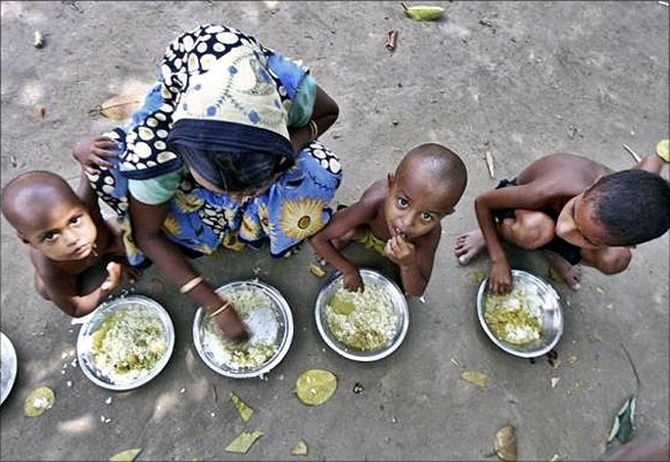On November 7, which marks 100 years of the Russian Revolution, Syed Firdaus Ashraf recalls a conversation he once had on Communism.

November 7, 2017 marks the centenary of the Bolshevik Revolution, '10 Days That Shook The World,' as John S Reed, the American journalist who reported on those tumultous events 100 years ago, called it.
The call Karl Marx issued to the 'workers of the world' to unite was first realised when Lenin established a Communist State in Tsarist Russia.
The Union of Soviet Socialist Republics survived for 74 years till the USSR quickly dissolved into independent nations on December 26, 1991.
As my taxi stopped at a traffic light last week, a child started vigorously knocking on its window, asking for money.
There were several other children like him around, knocking on windows of the many cars waiting at the traffic light.
And then there were children frantically running from vehicle to vehicle to find someone interested in buying the stuff they were selling, mostly flowers.
I observed the child outside my taxi closely.
He had a running nose, uncombed hair, and was wearing an over-sized, torn, t-shirt.
As the traffic light turned green, all the cars sped away. And the kids went back to the kerb, waiting for the red light once again.
What I saw that afternoon I have seen for years.
In these 40 years, only the faces of these children have changed.
India may be on the cusp of being a self-declared economic superpower, but the poor have not disappeared from our streets.
As a teenager, I used to get very angry about the poor in our country.
I wanted answers.
Why were these children forced to beg?
Why were they not going to school like me?
Why were they hungry?
Why was God not helping them?
Then one day, I met my father's friend. 'Uncle', as we respectfully hail our elders in this country, is a hardcore Marxist.
Instead of answering my questions on poverty, he told me, "Let me tell you Firdaus, there is enough food in this world for everyone. Still, people go hungry. You find out why, and then come to meet me."
His reply opened a new box of questions for me: When there is enough food in the world, why are so many people hungry?
What is God doing? Can't He see?
What is our government doing? Why are people poor? And so on.
After a sleepless night, pondering over such questions, I called on 'Uncle' the next day.
What he said turned me into something of a Marxist for several years to come.
"The problem," he said, "lies with the distribution of food."
"In the capitalist system, the rich and bourgeoisie seize all the food as they have money. The poor, on the other hand, are left to die on the streets. The food is not properly distributed and therefore you see those beggars on the streets."
"Why can't the government do something about it?" I asked.
"In a democracy," 'Uncle' asserted, "the government is for the bourgeoisie, by the bourgeoisie and of the bourgeoisie. Only a Communist system can change the situation for which the workers of the world must unite."
"I've read that phrase," I said, "but never understood its meaning."
'Uncle' then enlightened me about Marx and his call to the world's workers.
"The worker uses one part of a labour day to cover the expenses of maintaining himself and his family (by earning wages). During the other part of the day," 'Uncle' said, "the worker toils without remuneration, creating surplus value for the capitalist, the source of profit, the source of the wealth of the capitalist class."
The doctrine of surplus value, 'Uncle' explained, is the cornerstone of Marx's economic theory.
"Till the time the rich don't distribute their surplus value -- or riches -- poverty will never be solved," he said.
"The rich are too greedy to part with their wealth," he said, "so one day the poor, peasants and workers, will have to grab it forcefully."
"That is why," he added, "Marx said, 'Workers of the world unite'."
History, he argued, moves in stages.
"The French Revolution abolished feudalism in favour of the bourgeoisie. And the abolition of bourgeois property will lead to a Communist State which will get rid of poverty."
Quoting Friedrich Engels, Marx's colleague, he said, "Just like Charles Darwin discovered the origin and evolution of species, Marx discovered the evolution of human history."
"Humankind must get food, shelter and clothing before they can pursue politics, science, religion, art etc."
In other words: 'Roti. Kapda. Makaan (Food. Clothing. Shelter).
"You have given many years of your life to Communism," I asked 'Uncle', "do you foresee a future India where there will be no beggars?"
In response, he quoted Sahir Ludhianvi's song, "Woh Subah Kabhi Toh Aayegi (That morning will dawn someday)."
"And who," I asked, "will bring that revolutionary change in India?"
'Uncle' turned again to Marx: "Philosophers have only interpreted the world differently; the point is to change it."
"Lenin did it in 1917 by bringing the revolution to Russia. Now, you bring the revolution to India or keep seeing children begging on the streets."
"Me?!!!" I exclaimed. I guess he meant the younger generation.
More than 25 years later, I often recall that conversation when I encounter children begging on the streets.
While waiting for the traffic light to turn green, I feel Communism will never die as long as children beg on the streets.
Photograph: Reuters








